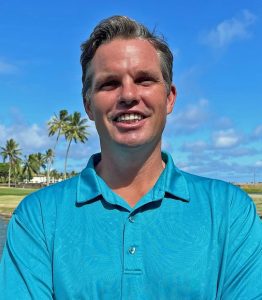Dealing With Dyslexia – Tom Freestone
 When you’re done reading this first paragraph, start over. Then read it again. And a few more times after that. That process provides a very small taste of what people with dyslexia, like Tom Freestone, the Director of Golf Operations at the Ocean Course Hokuala in Hawaii, experience. The International Dyslexia Association defines dyslexia as “a cluster of symptoms that results in people having difficulties with specific language skills, particularly reading.” It affects 20 percent of the population, represents 80–90 percent of all those with learning disabilities, and is the most common of all neuro-cognitive disorders, according to the Yale Center For Dyslexia & Creativity.
When you’re done reading this first paragraph, start over. Then read it again. And a few more times after that. That process provides a very small taste of what people with dyslexia, like Tom Freestone, the Director of Golf Operations at the Ocean Course Hokuala in Hawaii, experience. The International Dyslexia Association defines dyslexia as “a cluster of symptoms that results in people having difficulties with specific language skills, particularly reading.” It affects 20 percent of the population, represents 80–90 percent of all those with learning disabilities, and is the most common of all neuro-cognitive disorders, according to the Yale Center For Dyslexia & Creativity.
Freeestone’s dyslexia was uncovered at a young age. “I was lucky because my mom kind of recognized it when I was in kindergarten,” said the 39-year-old Alaska native. “That was a big plus because if you go untreated, or just don’t have the same level of understanding, people think ‘Why is this kind not getting it?’ But my mom knew I was pretty smart. I was just missing something.” He started getting extra tutoring after school, especially with reading. “My reading speed was about one-tenth of everybody else, so I would fall behind quickly,” he said.
His family moved to Aberdeen, Scotland, when he was nine, which meant encountering another school system. He took special classes there to catch up. “I’d have general classes like everyone else from 8 a.m. to 3 p.m., but I would always have tutoring at someone’s house for another hour or two. I couldn’t go play with my friends. Instead, I was dissecting sentence structures.”
After returning home to Alaska, a family vacation to Hawaii changed his life. Playing with his father and brother at Kukuiolono Golf Course, a 9-holer on Kauai, Freestone discovered his true calling. “In school, I didn’t feel like the greatest student, but being out on the golf course, was something I definitely excelled at,” he said. “I was much more comfortable out there than in school.”
Setting his sights on becoming a golf professional on Kauai (like many others, he fell in love with the island at first sight), he worked at a golf simulator facility in the winter and at a golf course during the summer in Alaska, then went to the San Diego Golf Academy before landing a job as a golf shop attendant at Princeville Makai. Just six months later, he became an assistant golf pro there. “I stayed for six years until 2009, and then tried to play professionally on mini-tours for a year,” he said. “I was down to the last entry fee in my bank account when I got offered an assistant’s job at The Prince Course on Kauai. I returned to Princeville Makai under then general manager Alex Nakajima from 2012 to 2021.”
Part of that latter job involved leading the popular 90-minute Sunset Cart Tour of the spectacular property. “For someone who has been in the struggle of dyslexia, never would I have expected to stand up in front of people every night and do a tour. Public speaking never came to my mind when I was growing up. That would have been one of my biggest fears.” But he handled it deftly in front of thousands of people before moving to his current position at the Ocean Course Hokuala in July 2021.
Adapting to the array of challenges presented by dyslexia is still a focus for Freestone. “Generally now I don’t stress over internal emails. I keep those short and sweet to my team. During the pandemic ZOOM has really helped utilize my strengths, versus relying upon email for communication. Still, I’m much better at communicating in person. I have to realize where my weaknesses are, and be very open and up front about those. This is who I am.”
Freestone says his biggest strength is seeing things in more of a 3-dimensional aspect. “When I go through our golf rate structure, I know how one change will affect three or four other things. I’m very much aware of the whole picture and how everything intertwines. Sometimes there’s confusion because I’m seeing things that will affect outcomes 5 years down the line and others don’t. That’s when my team often helps me focus on what’s important right now. I need to rely on them because I can’t hold on to every detail. I empower everyone around me and have a high level of trust with them.”
Freestone encourages those whose lives have not been touched by dyslexia in some way to take a look at it from a different angle. “Even though sometimes it may take a little more work to understand something, you may have one of the most valuable people in your organization if you utilize them the way they can help you. Whether I’m coaching a student or mentoring an associate, being flexible to adapt to their learning style or the way they go about things has been a critical part of my success.”
Follow #GolfForEveryone
For more stories on Troon’s DEI initiative and associates
Learn more about Troon’s DEI Initiatives, Associates and Stories.